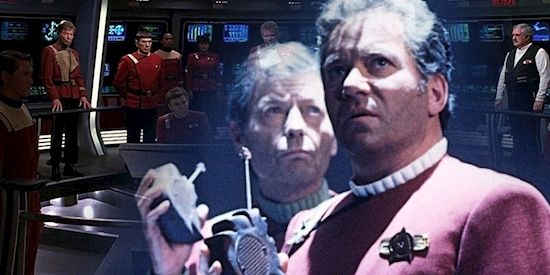Star Trek 6 Still Holds A Franchise Record 30 Years Later
In 1992, the sixth movie in theStar Trekfranchise, Star Trek VI: The UndiscoveredCountry, set a franchise record that still hasn't been beat — almost 30 years after the movie's 1991 release.Star Trek first aired during the 1966 broadcast season, and was only a moderate success, being cancelled after its third season; however, the show developed a dedicated fanbase in syndication, and the first feature film, Star Trek: The Motion Picture was a huge hit — propelling the franchise into being a major pop culture property. Over the years, Star Trek has reached a number of noteworthy milestones, both critically and culturally, but one such achievement has only happened once — and Star Trek 6 was the film that did it.
Click the button below to start this article in quick view. Start nowGene Roddenberry created Star Trek to comment on social issues and view the future with a sense of optimism. His core concept was to have a Western in space, but he executed it with a deft hand, which allowed the sci-fi show to challenge and break down social barriers. The subsequentmovies were more action-oriented than TOS was, but remained true to the show's ethos. Star Trek 6 was no different, and its willingness to tackle contemporary political issues was a key element of its success.
By the time The Undiscovered Country hit theatres, Captain James T. Kirk (William Shatner) and his crew had been pop culture icons for 25 years. The sequel TV series Star Trek: The Next Generationwas already an established hit, set roughly a century after the events of TOS. Leonard Nimoy, who directed the Star Trek movies The Search for Spock and The Voyage Home, was approached about doing a swan song for the original cast to coincide with the 25-year anniversary. While he ultimately declined to direct, he did help conceive of the movie's story. Star Trek 6 was by no means a cheap production, but it did use a modest budget (relative to the time) and relied more on a strong story than spectacular setpieces. As a result of its strong plot and acting, the movie was a huge success. It won a number of awards, including the Saturn Award for Best Science Fiction film — and to date, is the only Star Trek film to do so.
Leonard Nimoy famously proposed Star Trek 6 be the Starfleet/Klingon version of the Berlin Wall coming down, which had just occurred in 1989. While The Next Generation revealed that in the future, The United Federation of Planets and the Klingon Empire were no longer at war, TOS never actually demonstrated those events. In a way, The Undiscovered Country served to both bridge TOS and TNG and comment on the recent events in Germany that were no doubt active in the minds of audiences. Star Trek 6 was a sweet conclusion for the original Enterprise crew, with a plot that embraced the actors' age and self-deprecating humor, while allowing the characters to bow out with dignity. Gene Roddenberry reportedly hated the script, as the Star Trek creator disliked any depiction of bigotry or corruption within Starfleet; however, his opinion was in the minority, as many reviewers largely praised the movie's writing and direction.
The quality of Star Trek 6 is reflected in its Saturn Award for Best Science Fiction Film, which it received in 1992; other films to have received this honor include Terminator 2: Judgement Dayin 1991 and Jurassic Park in 1993. The Saturn Awards are a major American awards ceremony presented by the Academy of Science Fiction, Fantasy & Horror Films; beginning in the early 1970s, the Saturn Awards was created to address concerns that genre films (like sci-fi and horror) were not fairly recognized by Hollywood's existing awards bodies. Arguably, Star Trek 6benefitted from a lack of strong sci-fi movies to compete against, and had it been judged against Terminator 2, it may not have won. Regardless, this achievement is a noteworthy one that has yet to be repeated in the franchise.
About The AuthorSource: screenrant.com

